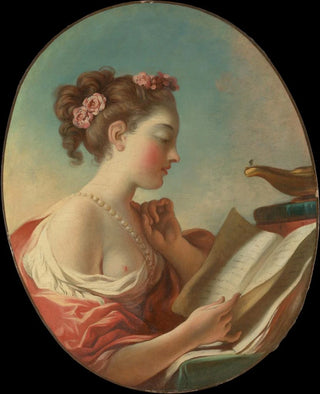Art print | Allegory of Vigilance - Jean-Honoré Fragonard


View from behind

Frame (optional)
The artwork "Allégorie de la vigilance" by Jean-Honoré Fragonard is a masterpiece that embodies the very essence of 18th-century French art, a period where art and philosophy intertwine to express complex ideas through captivating forms. This canvas, imbued with sensuality and delicacy, evokes a profound reflection on vigilance, a quality often underestimated in a constantly evolving world. By contemplating this piece, viewers are invited to question the meaning of awakening and consciousness, universal themes that still resonate today. The art print of this iconic work allows for an exploration of these notions while adding a touch of elegance to any living space.
Style and uniqueness of the work
Fragonard, master of rococo, deploys in "Allégorie de la vigilance" a palette of shimmering colors and dynamic compositions that captivate the eye. The lightness of the strokes and the fluidity of the forms are characteristic of his style, offering an atmosphere that is both playful and introspective. The figures, delicately modeled, seem to dance across the canvas, evoking a perpetual movement that draws the eye and stimulates the imagination. The representation of vigilance is expressed through symbolic elements, such as open eyes and expressive gestures, suggesting constant attention. This visual language, both accessible and complex, makes this work an aesthetic reflection on human nature and its contradictions, while celebrating beauty and grace.
The artist and his influence
Jean-Honoré Fragonard, born in 1732 in Grasse, is one of the most emblematic artists of the rococo movement. His artistic journey led him to associate with major figures of his time, such as François Boucher and Antoine Watteau, from whom he drew inspiration while developing a personal style. Fragonard captured the spirit of his era, marked by a pronounced taste for exuberance and lightness. His works, often imbued with sensuality and romanticism, testify to a keen sensitivity to human emotions. Fragonard's influence extends beyond his time; his

Matte finish

View from behind

Frame (optional)
The artwork "Allégorie de la vigilance" by Jean-Honoré Fragonard is a masterpiece that embodies the very essence of 18th-century French art, a period where art and philosophy intertwine to express complex ideas through captivating forms. This canvas, imbued with sensuality and delicacy, evokes a profound reflection on vigilance, a quality often underestimated in a constantly evolving world. By contemplating this piece, viewers are invited to question the meaning of awakening and consciousness, universal themes that still resonate today. The art print of this iconic work allows for an exploration of these notions while adding a touch of elegance to any living space.
Style and uniqueness of the work
Fragonard, master of rococo, deploys in "Allégorie de la vigilance" a palette of shimmering colors and dynamic compositions that captivate the eye. The lightness of the strokes and the fluidity of the forms are characteristic of his style, offering an atmosphere that is both playful and introspective. The figures, delicately modeled, seem to dance across the canvas, evoking a perpetual movement that draws the eye and stimulates the imagination. The representation of vigilance is expressed through symbolic elements, such as open eyes and expressive gestures, suggesting constant attention. This visual language, both accessible and complex, makes this work an aesthetic reflection on human nature and its contradictions, while celebrating beauty and grace.
The artist and his influence
Jean-Honoré Fragonard, born in 1732 in Grasse, is one of the most emblematic artists of the rococo movement. His artistic journey led him to associate with major figures of his time, such as François Boucher and Antoine Watteau, from whom he drew inspiration while developing a personal style. Fragonard captured the spirit of his era, marked by a pronounced taste for exuberance and lightness. His works, often imbued with sensuality and romanticism, testify to a keen sensitivity to human emotions. Fragonard's influence extends beyond his time; his






